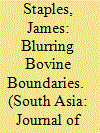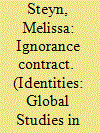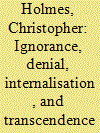|
|
|
Sort Order |
|
|
|
Items / Page
|
|
|
|
|
|
|
| Srl | Item |
| 1 |
ID:
169999


|
|
|
|
|
| Summary/Abstract |
Drawing on ethnographic fieldwork with butchers, cattle traders and beef eaters in South India, the aims of this paper are twofold. Firstly, it challenges two dominant assumptions made in respect of cattle slaughter and beef consumption in South Asia: one, that the beef trade directly concerns only Muslims, Dalits, Adivasis and Christians, and two, that respect for cattle is the near sole preserve of upper-caste Hindus. Secondly, given the strength of the empirical evidence against these two assumptions, it considers how such a stark framing of the debates along caste and communal lines has been sustained so successfully and for so long. Using insights from the anthropology of ignorance—to which this article makes a unique contribution—I argue that part of the answer lies in the strategic acts of not knowing what goes on at particular junctures along the chain from the cowshed to the dinner plate, which a number of different actors are complicit in working to maintain.
|
|
|
|
|
|
|
|
|
|
|
|
|
|
|
|
| 2 |
ID:
112395


|
|
|
|
|
| Publication |
2012.
|
| Summary/Abstract |
Working with the recollections of everyday experiences of apartheid collected by the Apartheid Archives project, and drawing on the emerging theorization of ignorance in the critical philosophy of race, this article explores how an 'ignorance contract' - the tacit agreement to entertain ignorance - lies at the heart of a society structured in racial hierarchy. Unlike the conventional theorization of ignorance that regards ignorance as a matter of faulty individual cognition, or a collective absence of yet-to-be-acquired knowledge, ignorance is understood as a social achievement with strategic value. The apartheid narratives illustrate that for ignorance to function as social regulation, subjectivities must be formed that are appropriate performers of ignorance, disciplined in cognition, affect and ethics. Both white and black South Africans produced epistemologies of ignorance, although the terms of the contract were set by white society as the group with the dominant power.
|
|
|
|
|
|
|
|
|
|
|
|
|
|
|
|
| 3 |
ID:
120465


|
|
|
|
|
| Publication |
2013.
|
| Summary/Abstract |
In this article, I suggest what an engagement between post-structuralism and the work of Karl Polanyi might look like. I do this by presenting a reading of Polanyi's concept of 'double movement' as a form of problematisation through binary opposition. I suggest that the central opposition that the double movement depicts - between economy and society as reflected in processes of marketisation and social protection - presents itself in such a way that the problems emanating from the opposition can only be solved through its transcendence. On one hand, the terms of transcendence are limited by the terms of the opposition. On the other hand, since transcendence is never reached, the double movement problematisation stabilises the existence of a lacuna between the lived experience of market society and the discursive field of that market society. As such, the form of the problematisation places a double-limit upon the ways in which 'solutions' can be presented. I present this thesis in relation to two instances of double movement discussed by Polanyi in his book, The Great Transformation. I then apply the argument to invocations of the economy-society opposition in contemporary political economic discourse, where it remains as ubiquitous as ever.
|
|
|
|
|
|
|
|
|
|
|
|
|
|
|
|
|
|
|
|
|